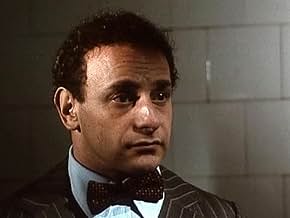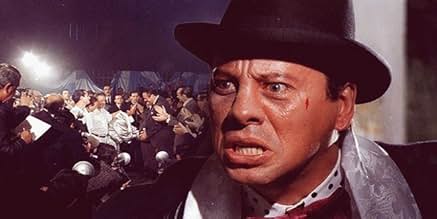An Argentina film, which narrates the life of Argentine boxer José María Gatica, from his childhood until his tragic death in Buenos Aires in 1963.An Argentina film, which narrates the life of Argentine boxer José María Gatica, from his childhood until his tragic death in Buenos Aires in 1963.An Argentina film, which narrates the life of Argentine boxer José María Gatica, from his childhood until his tragic death in Buenos Aires in 1963.
- Director
- Writers
- Stars
- Awards
- 7 wins & 6 nominations total
Eduardo Cutuli
- Fioravanti
- (as Cutuli)
- Director
- Writers
- All cast & crew
- Production, box office & more at IMDbPro
Featured reviews
Based on some of the enthusiastic reviews that I read here (including one claiming that this film "makes Raging Bull look like a kindergarden film"), I was expecting a very raw, potent biopic about José María Gatica, also known as "El Mono" ("The Monkey"), a popular Argentine boxer who fought in the 40s and 50s, whose personal life was undone by excess and decadence. Instead, the film feels stagey and melodramatic. The music is too sentimental. Much of the acting, especially Eduardo Nieva's in the main role, feels forced. I think he tries a bit to imitate Al Pacino or Robert De Niro, but his constant screaming isn't visceral, just annoying. Gatica does come across as an out-of-control nouveau riche (who reminded me a lot of a certain Argentine football legend), but his portrayal of the character isn't compelling enough to keep one interested throughout two hours. I think Erasmo Olivera, who plays the younger Gatica, has significantly more presence on the screen. The photography is sometimes quite powerful, while other times it risks being overly nostalgic. Probably the movie's strongest point, it seems inspired by some of the films of Francis Ford Coppola or Bernardo Bertolucci. I was disappointed by most of the fighting scenes, with one exception, a surreal moment that combines unakin visual and sound elements: on the one hand, slow-motion shots of two boxers resting between rounds, panting heavily, sweating and bleeding profusely, and on the other, the voice of a priest delivering Mass in Latin. It happens unexpectedly and, although hard to explain exactly why, it works like magic. Somehow, the whole is greater than the sum of its parts. I wish there had been more surprises like that, more unpredictability and mystery. To be fair, this is an undeniably ambitious, probably fairly expensive period film with great production (costumes, cars, etc.) But perhaps the project became too large and complex for the director to pay attention to the details and give life to the characters. Gatica's story is unique and sad, worthy of a biopic. But the film lacks punch, if you'll pardon the pun. I actually found it painful to watch – unfortunately, for all the wrong reasons.
José María Gatica was an Argentine pugilist born in extreme poverty (he never attended school). His technical skills were not up to the best, but he compensated with a wild, free swinging ring style; he came out at the bell throwing non-stop punches and always fought to the bitter end. Extremely popular, he attracted the attention of President Juan Domingo Perón, a boxing enthusiast, who helped finance a trip to the US in quest of a world title. This dream was shattered when he fought World Champion Ike Williams in a non-title bout and suffered a first round knockout. This marked a steady decline in his career although his popularity was unabated for a while. Even people indifferent to boxing were excited by the series of brawls Gatica fought with his arch-rival Alfredo Prada, as legendary as the Sugar Ray Robinson - Jake LaMotta bouts were for Americans.
An improvident man, Gatica squandered or gave away his (at times considerable) income and ended up in poverty. A fervent Peronist, his problems were compounded when, after Peron's overthrow in 1955 he was persecuted and his boxing license was revoked. His old ring rival Prada gave him a job in his restaurant, but at the end of his life he was reduced to selling knick-knacks in soccer games. He was forgotten by his fans, although (in an ironic but not unusual twist of fate) there was an outpouring of popular grief at his funeral.
Gatica el Mono (Mono,"monkey" was one of Gatica's nicknames) makes a good job of putting Gatica's life on screen. Edgardo Nieva plays Gatica to perfection, aided by his striking resemblance to the the original. The whole film rests on Nieva's shoulders (this was his first acting credit). He is supported by an excellent cast. Leonardo Favio's direction tends to the melodramatic here and there, but this is probably intended; after all, Gatica's life seems to have been written by a Hollywood scriptwriter. The cinematography is lush, which suits the subject, and the reconstruction of time and place flawless. Music should perhaps have been toned down in some scenes. Boxing scenes are brutal and realistic. A good movie overall.
An improvident man, Gatica squandered or gave away his (at times considerable) income and ended up in poverty. A fervent Peronist, his problems were compounded when, after Peron's overthrow in 1955 he was persecuted and his boxing license was revoked. His old ring rival Prada gave him a job in his restaurant, but at the end of his life he was reduced to selling knick-knacks in soccer games. He was forgotten by his fans, although (in an ironic but not unusual twist of fate) there was an outpouring of popular grief at his funeral.
Gatica el Mono (Mono,"monkey" was one of Gatica's nicknames) makes a good job of putting Gatica's life on screen. Edgardo Nieva plays Gatica to perfection, aided by his striking resemblance to the the original. The whole film rests on Nieva's shoulders (this was his first acting credit). He is supported by an excellent cast. Leonardo Favio's direction tends to the melodramatic here and there, but this is probably intended; after all, Gatica's life seems to have been written by a Hollywood scriptwriter. The cinematography is lush, which suits the subject, and the reconstruction of time and place flawless. Music should perhaps have been toned down in some scenes. Boxing scenes are brutal and realistic. A good movie overall.
This is probably one of the worst films of all time. Bad in all departments, it is an insult to the audience that certain people praise this mistake.
There is nothing good to rescue from this piece of trash. In comparison, any film directed by Enrique Carreras is much better.
Even though, the only good thing featured in this disaster is the Mariano Mores theme "Tanguera", which was better recorded in 1955 by the Francini-Pontier orchestra for RCA Victor.
There is nothing good to rescue from this piece of trash. In comparison, any film directed by Enrique Carreras is much better.
Even though, the only good thing featured in this disaster is the Mariano Mores theme "Tanguera", which was better recorded in 1955 by the Francini-Pontier orchestra for RCA Victor.
Great tense movie. Sad story of José María Gatica "The Monkey" looks like you're in a theatre watching the tape.
Very raw and artistic movie. Directed by Leonardo Favio.
Total drama.
Very raw and artistic movie. Directed by Leonardo Favio.
Total drama.
To the average film-goer, the name Jose Maria Gatica known as "El Mono" (That's Spanish for Monkey) means little or nothing. But, to South American and Argentine fans, the name brings back memories of a colorful, romantic, and controversial time in Argentine history.
Jose Maria Gatica was born in extreme poverty in the capital of Buenos Aires, Argentina. He learned to fight in the streets and was discovered by Nicolas Preziosa who turned Gatica into "El Mono" and made him the nations greatest boxing idol of the mid 1940s & early 1950s. Noted for his "hurricane" style of punching, Gatica racked up an impressive knockout streak and became the toast of the country. Argentina's dictator General Juan Peron and his beautiful wife Evita were ringside for most of his fights. He had a pet lion, drank the finest wines from a host of beauties high-heeled shoes. He dressed in silk suits & dined and danced in the best clubs.
However, knockout losses, and his "fast-living" spelled his complete downfall. And fall he did. Deserted by his fans, shunned by Peron, he quickly faded from the scene after having scored a remarkable 72 knockout victories. He ended up a sad sight; broke, selling nic-nacs in the street. He died at age 38 after being run-over by a bus.
This is a disturbingly, well-acted film. It captures a time now long gone. In some ways, it's the story of all us........chasing dreams....dreams of love.......dreams of glory.......dreams of riches....sadly, in many cases, those dreams have passed us by......as has the legend of Jose "El Mono" Gatica,once the idol of his nation.
Jose Maria Gatica was born in extreme poverty in the capital of Buenos Aires, Argentina. He learned to fight in the streets and was discovered by Nicolas Preziosa who turned Gatica into "El Mono" and made him the nations greatest boxing idol of the mid 1940s & early 1950s. Noted for his "hurricane" style of punching, Gatica racked up an impressive knockout streak and became the toast of the country. Argentina's dictator General Juan Peron and his beautiful wife Evita were ringside for most of his fights. He had a pet lion, drank the finest wines from a host of beauties high-heeled shoes. He dressed in silk suits & dined and danced in the best clubs.
However, knockout losses, and his "fast-living" spelled his complete downfall. And fall he did. Deserted by his fans, shunned by Peron, he quickly faded from the scene after having scored a remarkable 72 knockout victories. He ended up a sad sight; broke, selling nic-nacs in the street. He died at age 38 after being run-over by a bus.
This is a disturbingly, well-acted film. It captures a time now long gone. In some ways, it's the story of all us........chasing dreams....dreams of love.......dreams of glory.......dreams of riches....sadly, in many cases, those dreams have passed us by......as has the legend of Jose "El Mono" Gatica,once the idol of his nation.
Did you know
- TriviaOfficial submission of Argentina for the 'Best Foreign Language Film' category of the 66th Academy Awards in 1994. However, it was pulled out of the competition by director Leonardo Favio himself as form of complaint about the problems of the film industry.
- SoundtracksTengo mil novias
Written by E. Cadicamo & E. Rodríguez
Details
- Runtime2 hours 16 minutes
- Color
- Sound mix
Contribute to this page
Suggest an edit or add missing content























